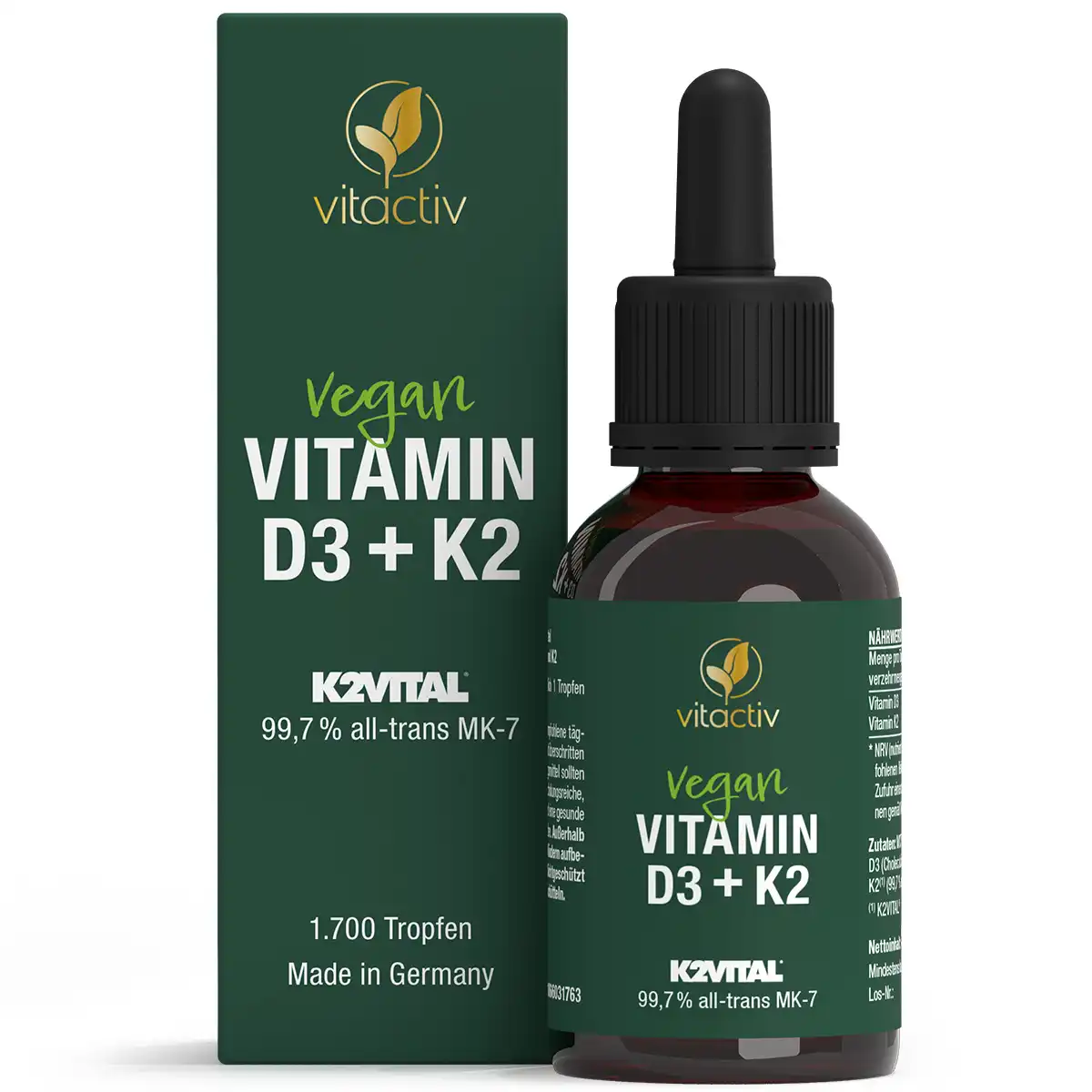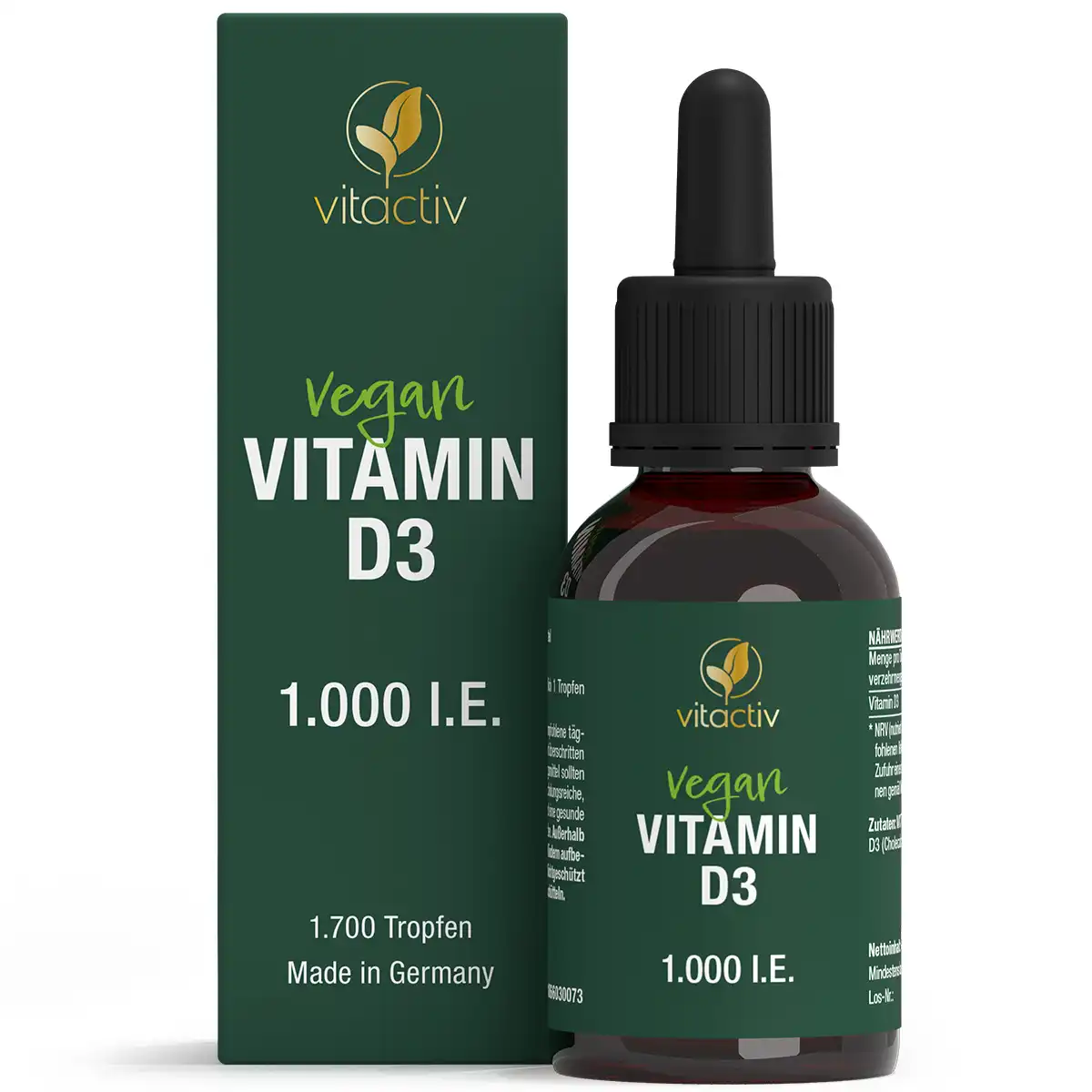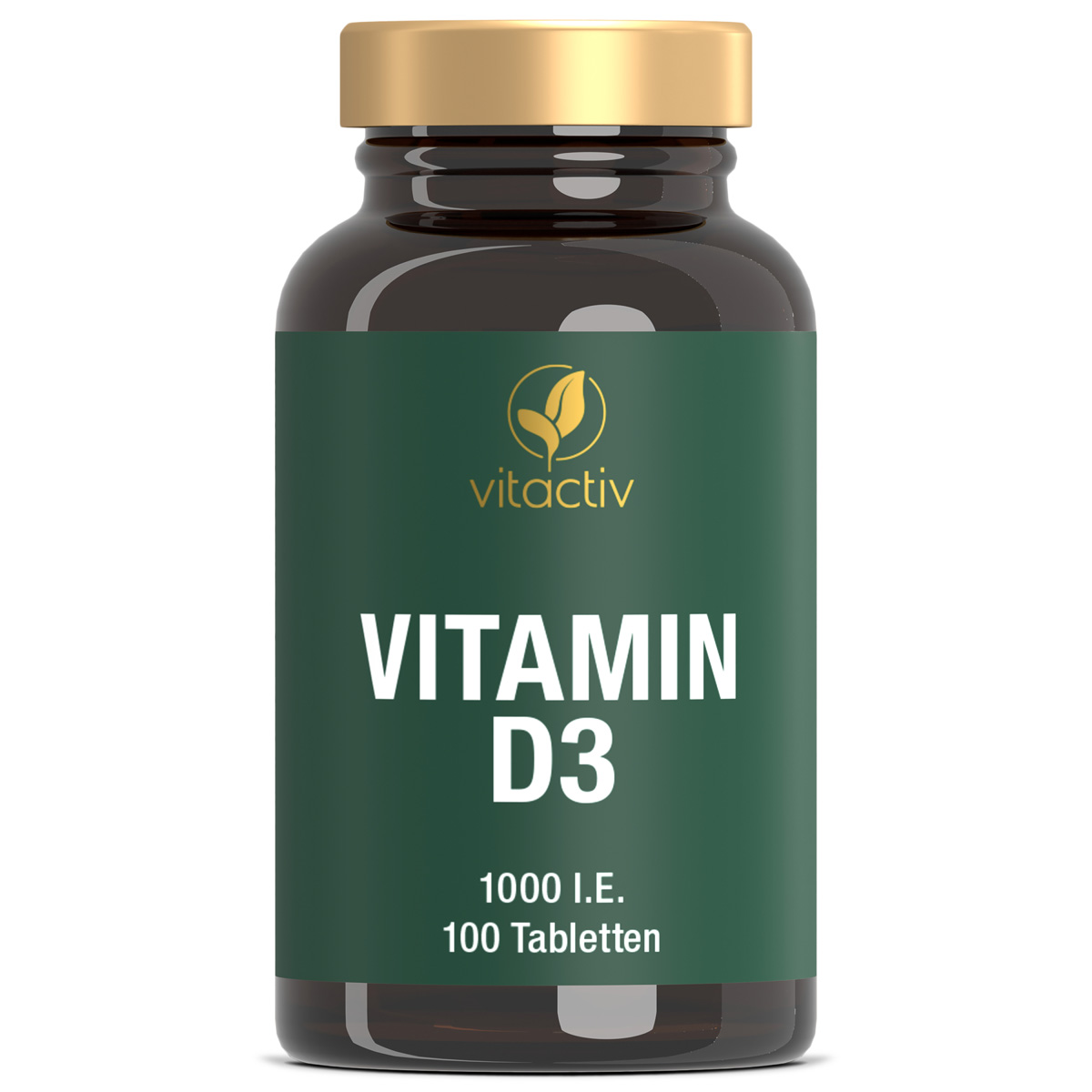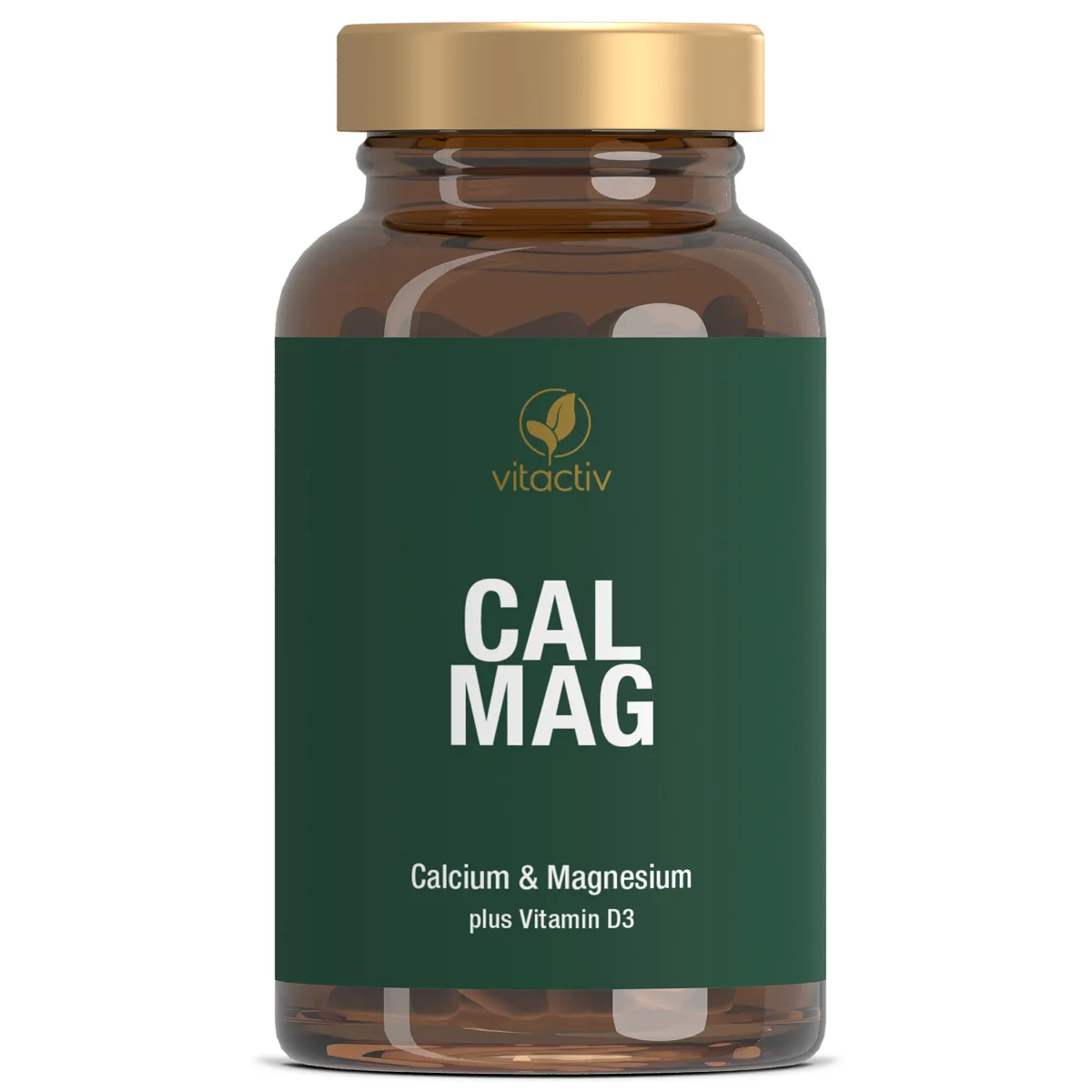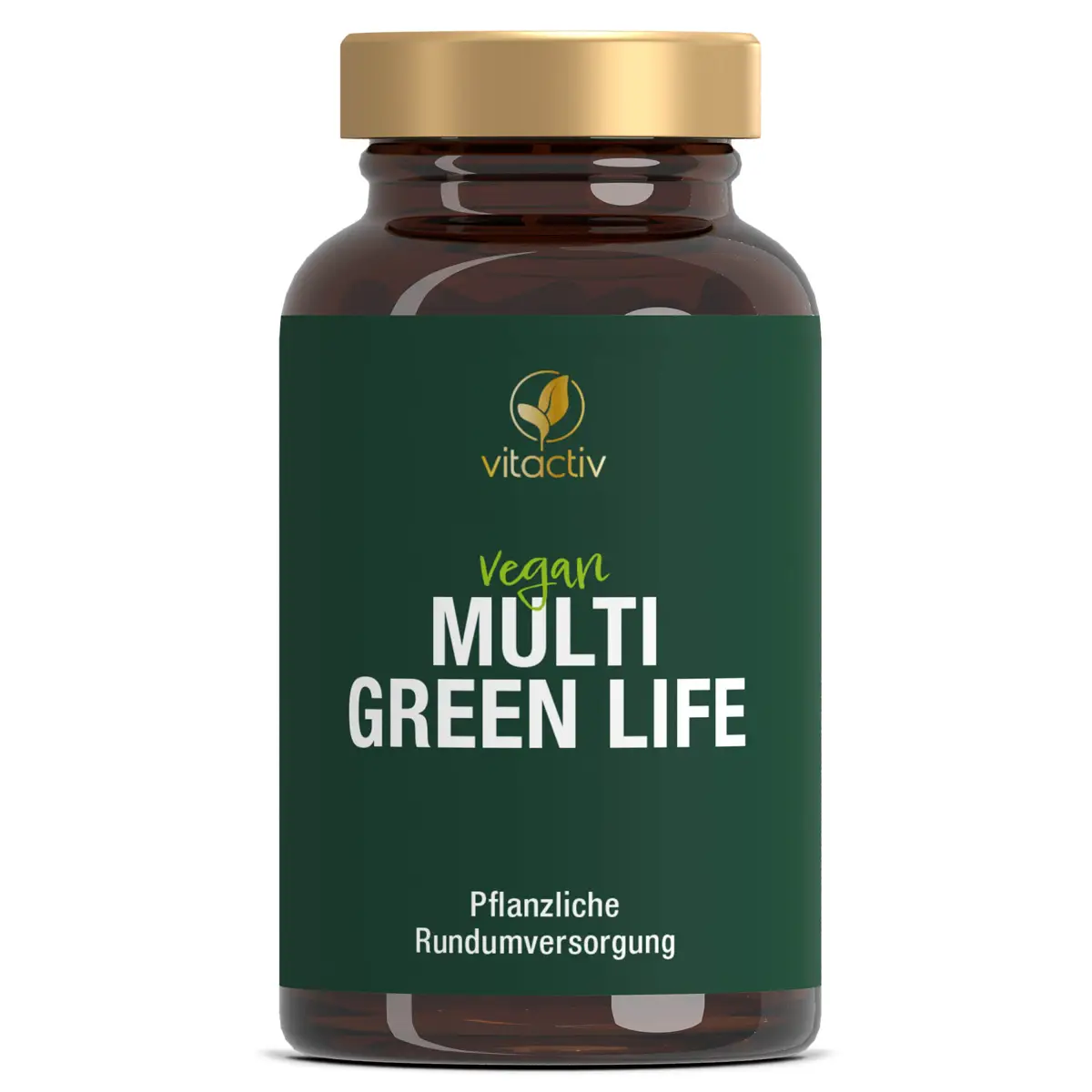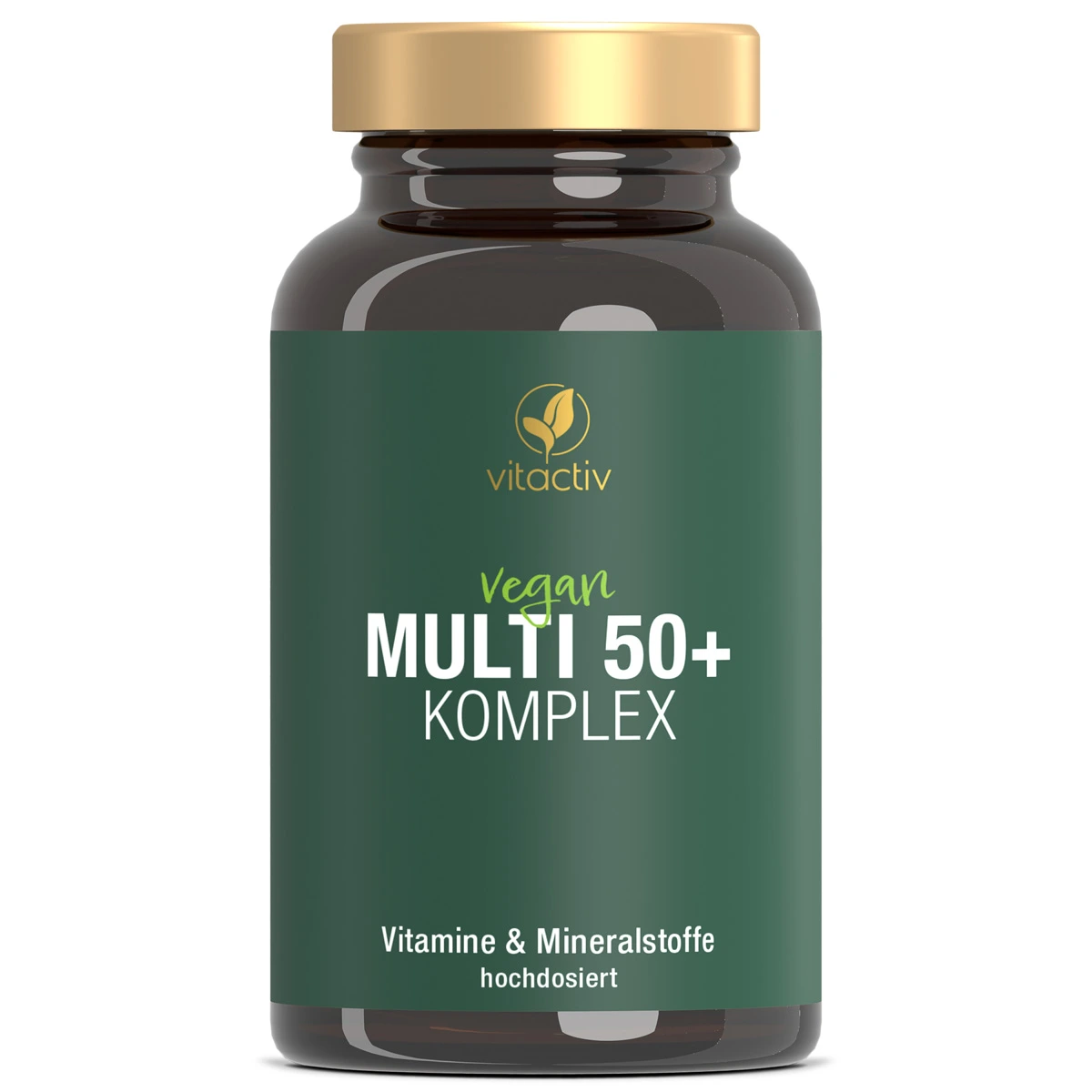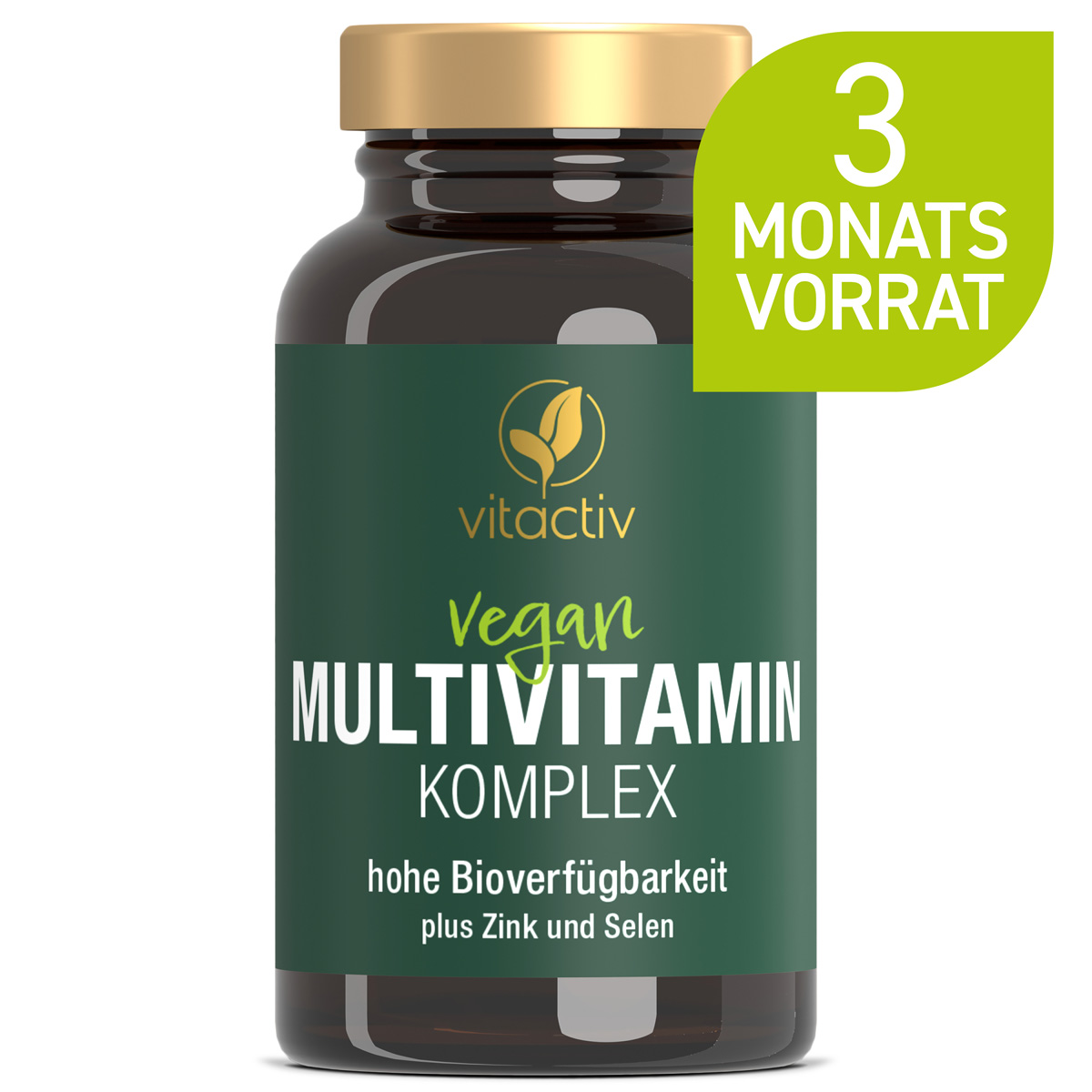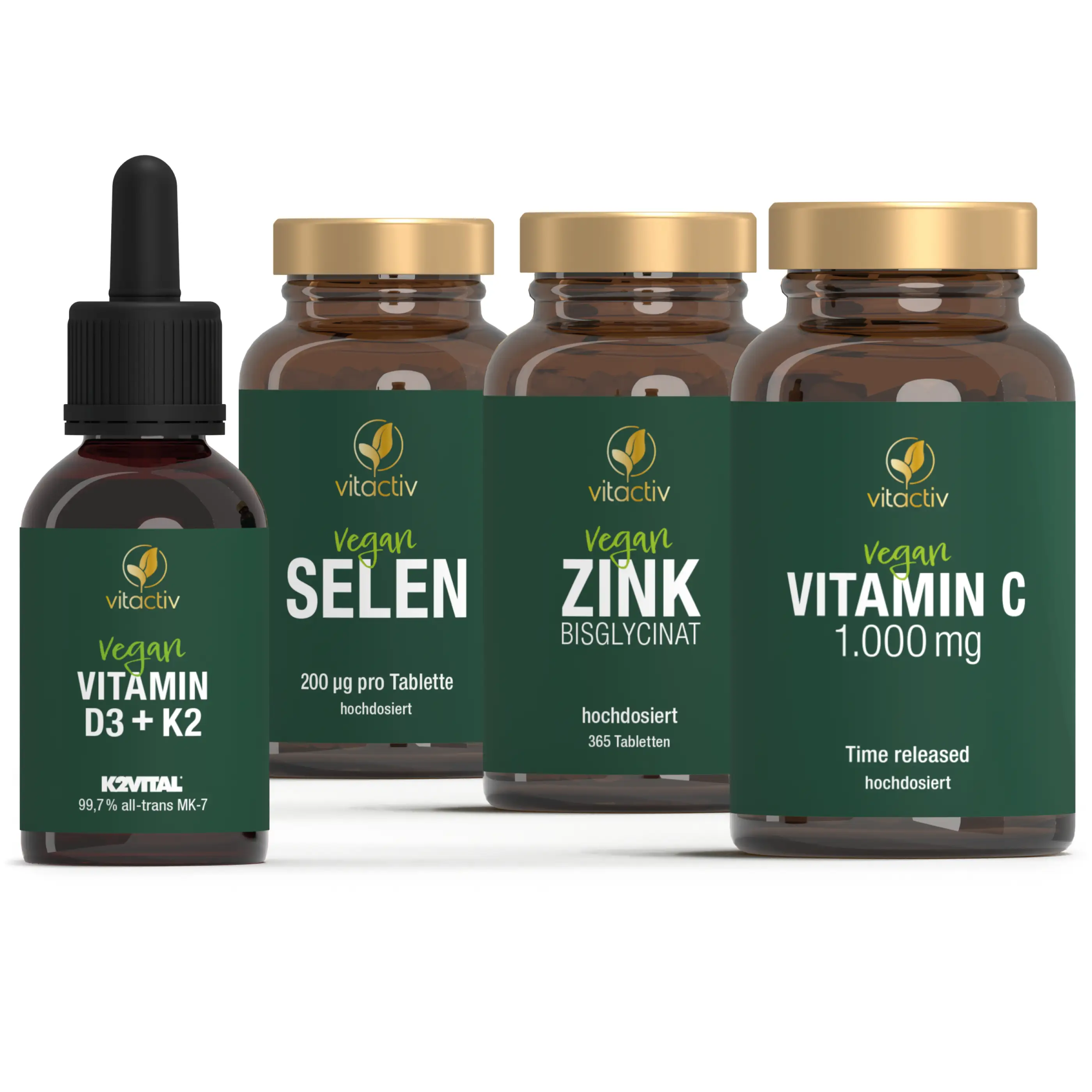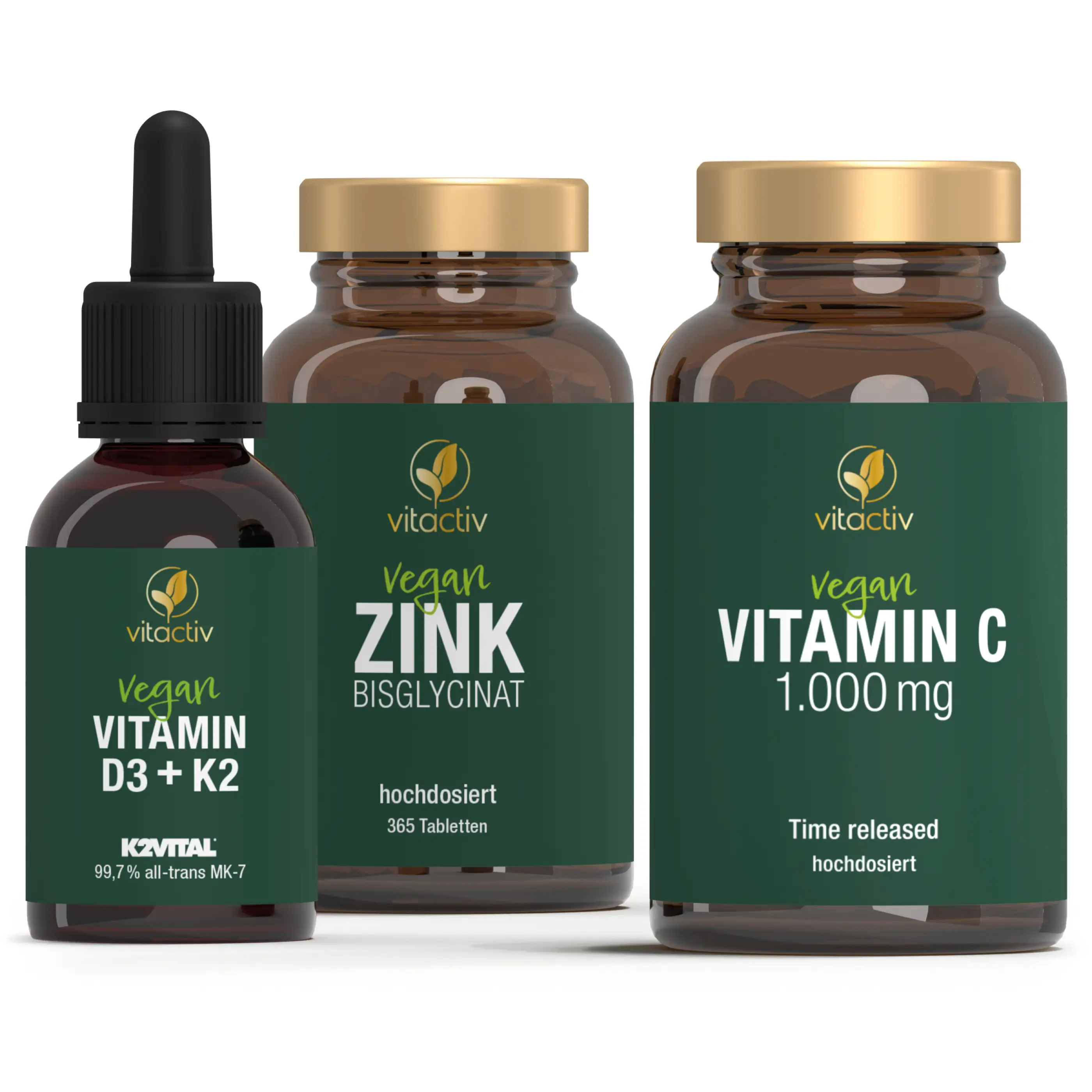Buy vitamin D
Content: 0.05 L (€399.80* / 1 L)
€19.99 €24.99
(€399.80 / 1 L)Content: 0.05 L (€339.80* / 1 L)
€16.99 €18.99
(€339.80 / 1 L)Content: 0.026 kg (€345.77* / 1 kg)
€9.99 (€384.23 / 1 kg)Content: 0.0585 kg (€153.68* / 1 kg)
€9.99 (€170.77 / 1 kg)Content: 0.0738 kg (€304.74* / 1 kg)
€22.49 €24.99
(€304.74 / 1 kg)Content: 0.045 kg (€279.78* / 1 kg)
€12.59 €13.99
(€279.78 / 1 kg)Content: 0.045 kg (€339.78* / 1 kg)
€15.29 €17.99
(€339.78 / 1 kg)Buy vitamin D: Why vitamin D3 is a valuable "sun vitamin"
Vitamin D is the sun vitamin for our body. It is produced by sunlight on the skin and is the only vitamin that can be produced by the body itself. Vitamin D supports the body in many ways. For example, its positive effect on the immune system is well known - vitamin D helps you to defend yourself against illness.
Vitamin D is produced naturally in our body - solely through the sun's rays on the skin. If you spend most of your time indoors and are rarely outdoors, you should consider taking the "sun vitamin" D3 as a dietary supplement to avoid a possible deficiency.
There are a number of questions that need to be asked in advance:
- Which vitamin D is the best?
- How much vitamin D should I take daily?
- What is the difference between vitamin D3 and D?
- Which vitamin D is available over the counter?
- Where can I buy high-dose vitamin D?
How much sun do people need to produce vitamin D?
Which people should pay particular attention to their vitamin D levels?
- Age: Older people often produce less vitamin D in the skin and also have a lower ability to store vitamin D in the body.
- Obesity: Fatty tissue can bind vitamin D and thus remove it from the bloodstream, making it less available for the body.
- Dark skin color: The production of vitamin D in dark skin is less effective.
- Low sun exposure through clothing or avoidance of sunlight due to risk of skin cancer or shift work.
- People in need of care and people with limited mobility who are often indoors as a result.
Pro tip: Targeted sunbathing promotes the production of vitamin D in the body
Targeted sunbathing can help to boost vitamin D production in the body. It is recommended that you spend around 5 to 30 minutes in the sun every day between March and October to replenish your vitamin D stores. Large parts of the arms and legs as well as the face should be uncovered.
The duration of sunbathing depends on the time of year, time of day, your skin type and the general UV index, which can vary.
Two to three times a week is sufficient. If you cannot adhere to these recommendations, you run the risk of not being sufficiently supplied with vitamin D. This affects a large number of people in Germany.
What happens in the body when there is a vitamin D3 deficiency?
A vitamin D deficiency can lead to various symptoms lead to
- Hair loss
- Hyperparathyroidism (hypofunction of the parathyroid gland)
- Bone pain,
- muscle cramps, muscle weakness, aching limbs
- migraine
- Impaired bone metabolism
- Osteoporosis or osteomalacia (bone mineralization disorder in adults)
- Weakening of the immune system
- Growth disorders and deformities
- Rickets (bone mineralization disorder in children and adolescents)
As you can see, taking vitamin D as a dietary supplement can be extremely important for your health. We have summarized why vitamin D is also important for your body here: Vitamin D: What is it important for?
Vitamin D - a fat-soluble vitamin
Strictly speaking, vitamin D is not a single vitamin, but a group of fat-soluble vitamins, of which cholecalciferol is the most important physiologically. Cholecalciferol is also known as vitamin D3. The term "fat-soluble" means that this vitamin is not soluble in water but only in fat and therefore requires a transport medium. In order to make optimum use of vitamin D, the body also needs a supply of fats.
How is vitamin D produced in the body?
In contrast to other vitamins, vitamin D has a special property, namely that our body is able to produce it itself. This happens through exposure to the sun, more specifically UV-B rays, as well as a precursor of the vitamin in the body. In Germany, the production of vitamin D through sunlight accounts for around 80 to 90 percent of the vitamin D supply. The body's own production of vitamin D takes place in four steps:
- The liver produces a precursor of vitamin D (7-dehydrocholesterol) from cholesterol.
- When sunlight hits the skin, the 7-dehydrocholesterol is converted into vitamin D3 (cholecalciferol) and transported to the liver.
- In the liver, vitamin D3 is converted into the storage form calcidiol and stored in fatty tissue.
- If there is a need for vitamin D, calcidiol can be released from the fatty tissue and converted into the active form calcitriol by the kidneys. This active form is then transported to all body cells.
The body's own vitamin D is stored in fatty and muscle tissue and partly in the liver as a storage form - practically like in a depot, as we know it from calcium and magnesium, whose depot is in our bones. When the body needs vitamin D, it can be released from the stores and converted into the active form. The body's stores are intended to ensure the supply of vitamin D for times when we have little or no vitamin D intake.
The vitamin is particularly important for bones, muscles and the immune system. A vitamin D deficiency can lead to decalcification and deformation of the bones, bone pain and muscle weakness.1
What is the difference between vitamin D3 and vitamin D?
Vitamin D3 is the most important physiological form of vitamin D and serves as a precursor from which vitamin D can be produced in the body - for the maintenance of normal bones, for the normal absorption and utilization of calcium and for a normal calcium level in the blood.
Can you overdose on vitamin D?
Yes, which is why you should always pay attention to the recommended daily intake of food supplements. The German Nutrition Society recommends a daily requirement of 800 IU (= 20 µg) of vitamin D.2 You should be very careful with some supplements - they contain up to 20,000 IU per drop, capsule or tablet! Such extremely high doses can lead to headaches, tiredness, weakness, severe thirst and even cardiac arrhythmia.
As far as the type of dosage is concerned, vitamin D tablets, drops and capsules can be dosed equally well. The advantage of vitamin D3 drops is that the fat-soluble vitamin D is formulated in vegetable oil. This means that it is not necessary to take additional fats to supplement vitamin D. We do not recommend loose vitamin D powder, as the dosage can quickly be exceeded when "spooned".
What types of vitamin D supplements are there and who are they suitable for?
Vitamin D supplements are available in the form of drops, capsules, tablets and powder. There are two main types of vitamin D supplements:
Vitamin D3 (cholecalciferol) and Vitamin D2 (ergocalciferol):
- Vitamin D3 is more effective at increasing blood levels of vitamin D as it is already the active form.
- In comparison, it takes longer to achieve the full effect when taking vitamin D2.
To obtain sufficient vitamin D, the body can produce it by exposing the skin to sunlight. An additional intake of vitamin D supplements in the form of capsules, drops or tablets is recommended if an insufficient supply has been proven.
What is the best way to take vitamin D?
Do I always have to take vitamin D together with vitamin K2?
Vitamin D3 for vegans
1Source:https://www.rki.de/SharedDocs/FAQ/Vitamin_D/FAQ05.html
2Source:https://www.dge.de/wissenschaft/referenzwerte/vitamin-d/
3Source:https://www.tk.de/techniker/magazin/ernaehrung/ernaehrungstrends/vegane-ernaehrung-2033920
If you have any questions or need advice, please contact us.
Call us at:
0800 678 7997
Write us a message here
Use our chat at the bottom left
Search our FAQs here

